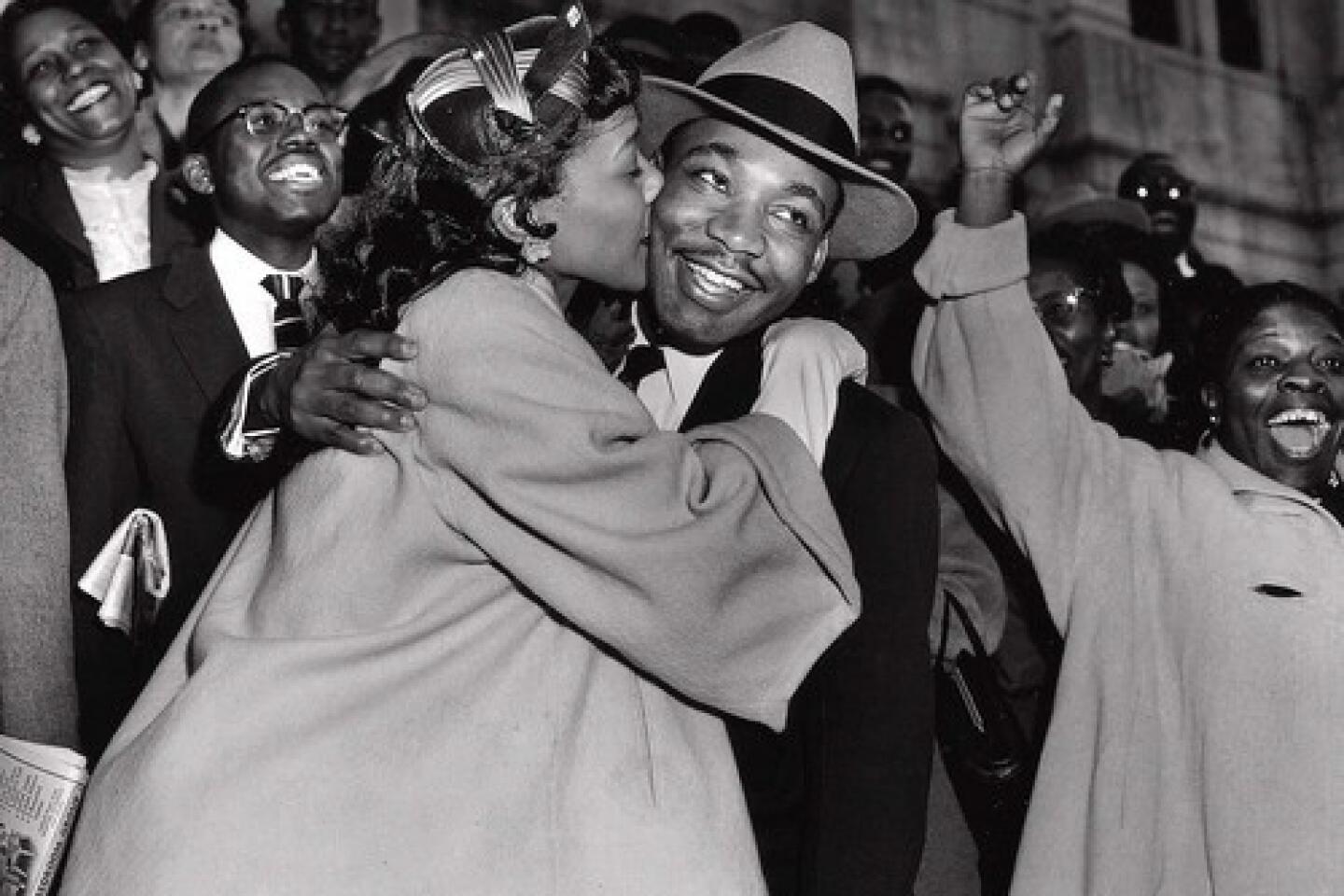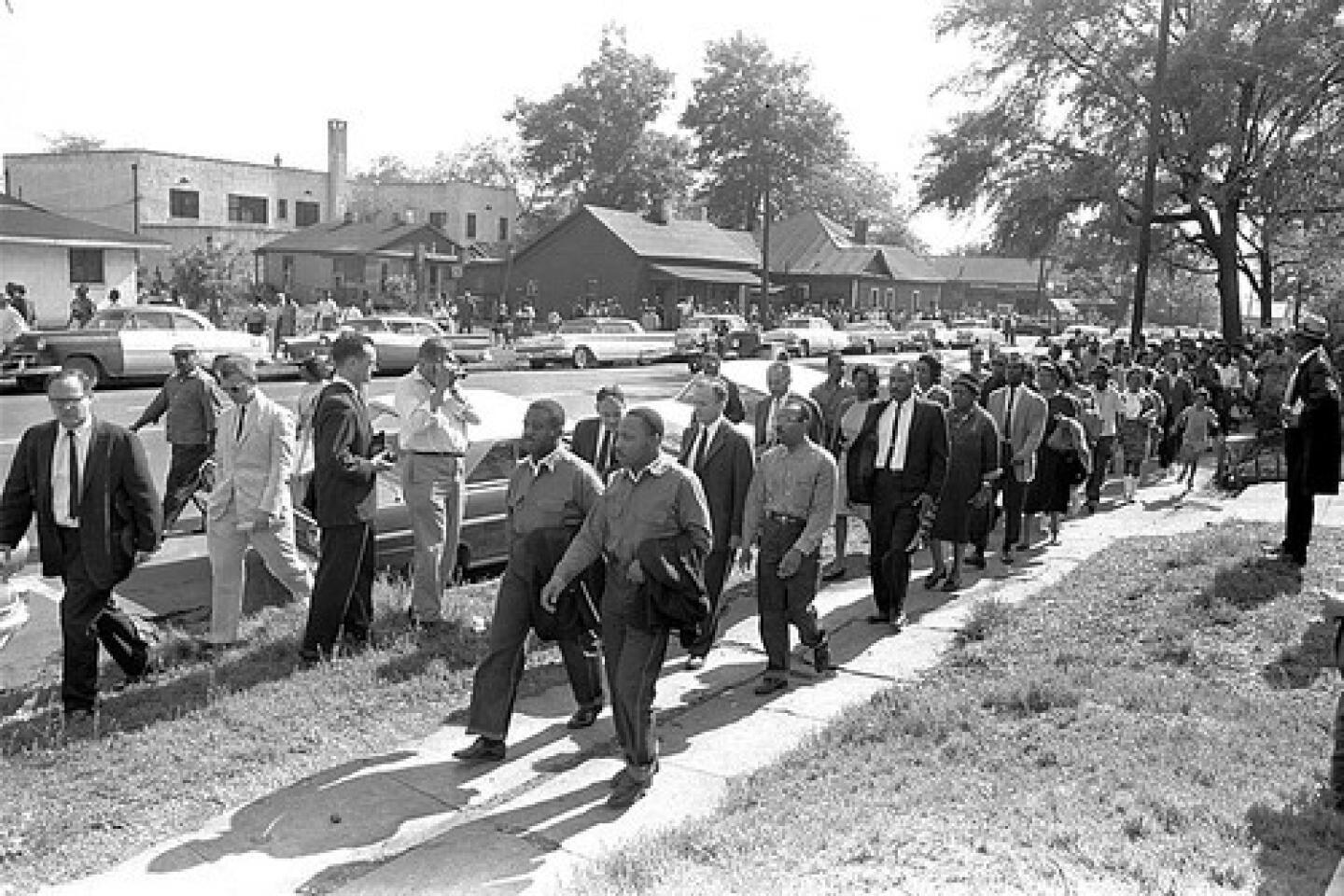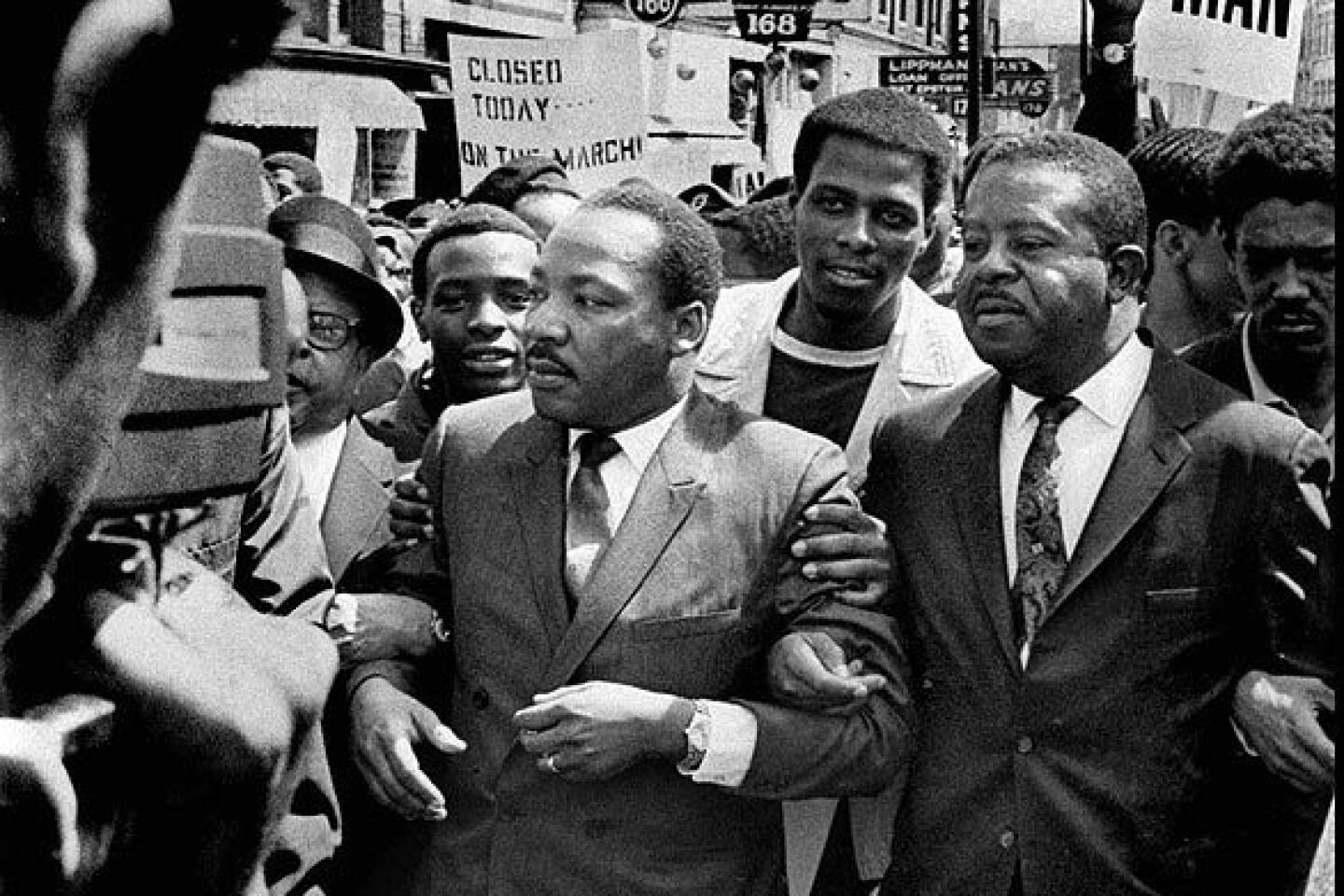‘The Murder of Dr. King’
Today marks the 40th anniversary of the assassination of Martin Luther King Jr. To mark the occasion, the editorial board , and the Los Angeles County Board of Supervisors is murder (the City Council refused to join in on the gesture). Congress held a ceremony; think tanks are thinking; conspiracy theorists won’t quit, and, some fear, history is revving up to repeat itself. Here at Cold Copy, we’re doing what we do: digging up what The Times said way back when, in the years leading up to and immediately after King’s tragic death.
The Times mentioned King briefly in passing in the early 1960s, discussing protests in Alabama but neglecting the march on Washington and King’s “I Have a Dream” speech. The news side of the paper did note that the speech received “perhaps the biggest ovation” in its day-after report, on Aug. 29, 1963. But even that quote came several paragraphs after liberal selections from a middling John F. Kennedy oration and comments from now-mostly-forgotten activists.
The Times board did devote a full piece to the civil rights leader after he won the Nobel Peace Prize. The Times wrote on Oct. 16, 1964, sounding the cautious tone it would take throughout the decade on protests:
Dr. King has preached, and shown by example, how the brotherhood of man is best achieved through nonviolent means. In the face of threats and bombings, his adherents have quietly moved toward their goal .”Nonviolent protest,” Dr. King has aptly said, “is the most effective weapon of an oppressed people.” Those who would deface his splendid work by mob action, or by any other unlawful means, would do well to ponder his wise words.
A few months later, the board paused to reflect on the assassination of another major black leader Malcolm X. The board had harsh words for him, and managed to jab at James Baldwin, too (unsurprisingly, the 40th anniversary of Malcolm X’s death received no mention on the editorial page):
Presumably on the theory that anything can be used to make a point, the assassination of the black nationalist leader known as Malcolm X has elicited a variety of self-serving comments.Perhaps the most interesting comes from novelist James Baldwin, who has blamed Malcolm’s death on the “climate” created “by all of you [meaning Caucasians] in the West.” Thus is the concept of collective guilt retrieved from history’s ash can .(brackets in original)The motivating power of these black extremists is hatred. Without a nurtured hatred Malcolm could not have thrived; without it he would not be dead.The investigation of Malcolm’s murder provides a chance for a thorough official look at the structure, strength, operations and financing of the entire Negro extremist movement .Such an investigation, properly conducted, might even prove enlightening to James Baldwin. Or is this too much to hope for?
The board wrote on March 23, 1965, two days before King’s march from Selma to Montgomery, Alabama, hoping for a peaceful event and advising “Negro leaders” how best to run their protest:
Whether the 54-mile walk from Selma to Montgomery really represents a contribution to civil rights, however, depends largely upon the good judgment of the Negro leaders when the march is over .Although one can question whether the Negro leaders really needed 3,200 demonstrators to make their point, the march is a dramatic display of the American people’s sentiments in this matter . This [civil rights] process will not be helped by demonstrations which continue merely for the sake of vindictiveness or of keeping the pot boiling.
Later that year, The Times, then in the habit of writing editorials highlighting pro-Vietnam-War events on campuses, commented on King’s pronouncements on foreign policy. The Times scolded him for daring to discuss “matters beyond his competence” on Sep. 14, 1965:
[King] may also feel that his Nobel Peace Prize, won for his non-violent efforts in the South, gives him a sort of mandate for meddling in areas of broader scope.It does not, of course, and to think otherwise is prideful foolishness. Prestige and know-how aren’t transferable. Authority in one area does not automatically mean wisdom in another .Aside from making himself look like a ridiculous busybody, Dr. King in his new endeavors runs a three-fold greater risk of harming the civil rights movement.
Three years later, and only days before his death, The Times was still wary of mass protests turning ugly. King’s planned “Poor People’s Campaign” march on Washington, the board opined on April 1, 1968, could be a disaster, particularly with a civil rights bill slogging through Congress:
It needs only a few hooligans or agitators to transform a legitimate protest into a major threat to public safety and welfare .The planned activities of Dr. King in Washington, it seems clear to us, can only be negative in terms of accomplishing civil rights progress. He should cancel these plans now, for the greater good of the civil rights cause and the nation.
Only four days later, the board wrote somberly of King’s death. Here it is in full, with good advice for marking today’s anniversary, too:
The Murder of Dr. KingThe murder in Memphis of Dr. Martin Luther King Jr. is an event of horror and shame to America and a shock to the world.It underscores once more the tragedy of the divisions which rip and tear at the basic fabric of our society. It stands inescapably as a further negation of the values, the dreams, the promises to which we as a people as one people aspire.Many have fallen in the cause for which Dr. King, preeminently an apostle of nonviolence and a winner of the Nobel Peace Prize, has now become a victim. The attack on him, like any criminal act, demands justice. Beyond that and let this be the fervent aim of all persons of decency it demands the most sober reflection, the deepest national self-examination.We do not believe in the concept of collective guilt. The person or persons responsible for the assassination of Dr. King alone carry the burden of their deed. But we most solemnly believe that all Americans have a stake in determining what kind of society we are, and what kind we are to become. This is why we say the occasion of this despicable bloodletting is a time for national assessment, a time for introspection.The lesson has once again been driven home, all too tragically: Americans will either agree to live together as one people under one standard of law and humanity, or we will be the witnesses and passive conspirators in the process of our own self-destruction.There is no evading this choice, for white or black, in Memphis, Los Angeles or anywhere.


